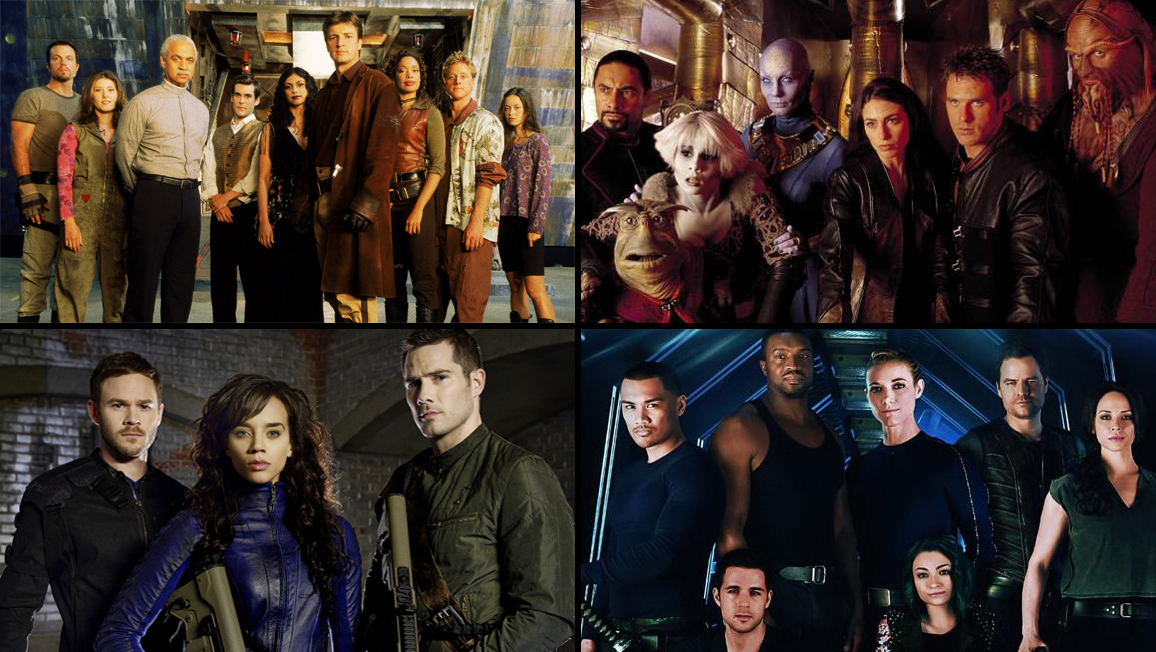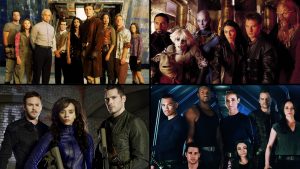
Whee! Happy GURPSDay!
So, I’ve been thinking… “A small ship’s crew living and working together from job to job” is pretty close to perfection as far as setups for an RPG go.
I mean, it’s got everything, whether it’s in space or on the sea: a simple way to introduce the party to new adventures, a reason for them to travel and explore, a logical in-game rationale for the PCs all sticking together, immediate hooks for both allies and enemies (other crews, other employers, the authorities), the constant possibility of environmental threats/ship breakdown, and on and on.
This was on my mind a lot in the past few weeks because I binged through the first seasons of both Dark Matter (a 6-person crew of criminals and their android) and Killjoys (a three-person crew of troubleshooters). They are both fun shows and they both come off like someone filmed their latest RPG adventures, something I love in my TV. These characters and the harrowing situations they find themselves in are so much like PCs in the show writers’ game that you can almost hear the dice rolling in the background.
They also remind me of a better show, Farscape, and the absolute apex of the “ship’s crew” genre, the much beloved and sorely missed Firefly.
All of these shows have characters that fall within the same broad categories, useful when structuring your PC team.
LEADER
Every ship’s crew needs a Leader, and maybe even a codified chain of command. Some groups may not want to have PCs of different ranks adventuring together, in which case the Leader will need to be an NPC run by the GM. They are often the ones with the contacts needed to procure new jobs.
SECOND
The Second is the one everyone looks to for guidance when the Leader is not around, and the one the Leader seeks counsel from. A strong Second (whether they are an “official” second-in-command or not) is a huge asset to the crew by providing moral support to the Leader, backing her up when she’s right and pointing out when she might be wrong.
TECHIE
Someone needs to keep the ship and gear in working order, invent great new equipment, and analyze newly discovered treasures and clues!
SUPPORT
These characters fill necessary secondary roles, usually things like healing, piloting, or being all stealthy.
MUSCLE
Most PCs are Muscle of one sort or another, though they’re often other things as well. These are the hitters, the soldiers, the warriors, the ones you want to be behind when the excrement hits the oscillator.
FACE
The social folks, the ones with lots of contacts and solid interpersonal skills for talking the group’s way out of tense situations, uncovering the next lead, or getting the best price for delivered cargo.
If you’re familiar with any of the shows I mentioned (and, hey, you really should be!), this is how their crews break down (more or less):
There is a really great GURPS product I can’t recommend highly enough for this kind of game, Supporting Cast: Age of Sail Pirate Crew. I find myself thumbing through this book constantly, regardless of genre, because it does such a great job of laying out the roles needed to keep a ship functioning and the types of adventures and obstacles a crew might find themselves facing.
Have you run games with the PCs as a ship’s crew before? Do you have other character setups that you like to use instead? You know me… I want to hear about it!
If you enjoyed this post and others like it, might you consider the Game Geekery Patreon?


Excellent advice. I’ve run a ton of Space campaigns, military and not, Traveller and not.
Regarding the leader, in my experience the NPC leader only works well with a military crew. This imposes a leadership dynamic that allows the leader to issue orders or assign missions that players attempt to follow, and allows for the setting of very clear goals. Otherwise, in my view a player character should lead. This allows the group to work out its own leadership dynamic. Confrontations and arguments not unlike those that occur throughout Firefly will occur under this scheme. If one of the players is “Captain,” the players have more autonomy and ability to influence story; if an NPC orders them to do something, it’s more like being railroaded.
Similarly, never ever provide the ship’s engineer as an NPC. Never. I tried this recently: it results in some of the laziest and sloppiest playing, as players just lean on the NPC to do all the technical and scientific work. When the NPC fails, players tend to simply accept it, rather than trying again, trying something new, etc. (as the player would themselves). Many space games will actually turn on matters of science or engineering, so having a player in this role is essential.
BTW, you left out Zoë under “muscle.” She would kick your ass around the block for that, you know. I get that you’re trying not to cross-classify them, but that’s the thing about space games: as societies advance in TL, people get more multitalented. Consider that Jayne is both muscle and support, as he appears to be a very accomplished and experienced spacer. Interestingly, the only character on that show who is specialized is Simon, and he is presented as the least competent space adventurer in the bunch.
Heinlein said it best: “Specialization is for insects.” It may be best to encourage players to create “Heinlein characters” for space games. Check out the Wikipedia entry for “Competent Man” (https://en.wikipedia.org/wiki/Competent_man). Narrow specialization in space games really only works for Star Trek and the like (and even then, those Prime Directive templates are very multidisciplinary).
RE: Pirates! In my ongoing space game, there is a crew of space pirates based entirely on that supplement. I even carried over some of the melee skills – TL11 space pirate carrying a saber? Yes, constructed of hyperdense steel with a monowire edge. I don’t think humans will ever get tired or stabbing each other.
I’ve made a personal vow to run only TL9+ games in the future, and to ensure there is an active space aspect in any TL9+ civilization. I’m inclined to run only Space games from now on, but I’m still working on GURPS Transmetropolitan, so…
Excellent points all, I agree with every letter.
I mostly just wanted to say, GURPS Transmetropolitan would be bad-ass. 🙂
Three words for you:
Legends of Tomorrow.
I am critical of the quality of the show, particularly the first half, but it’s a great guide to a group of PCs with more or less equal screen time.
Most TV has issues with translating to game because one characters much more screen time, or outclasses the others.
But LOT does a pretty good job only sometimes using ploy to disable a character.
Also.
I’ve wondered if GURPS could do a DF, MH, ATE, Action type series with the sci-fi ship as it’s thread. If so I would do it slightly differently. I’d have the templates as things like scoundrel, chosen one, mystic, alien, rookie etc with the lenses the command role on the ship.
So you can be a scoundrel captain- Mal
Or a Mystic pilot- (Anikan in some sense in the prequels)
Or an Alien whatever (pretty much anything a Vulcan did in Star trek)
Ah, yes, Legends of Tomorrow as well!
Good call — templates and lenses really do make the GURPS engine churn. Love how an Action “Military Face Man” feels different than a “Criminal Face Man” or a “Military Investigator.”
I’ve been GMing Prime Directive for several years. A game at cons, plus a monthly or so game at home. The PCs were the bridge crew. The success varied from game to game. I one player who was really good as a captain. Too bad there was not lenses for junior, mid, and command rank.
Then there is the proverbial grand daddy of them all, Blake’s 7. Somewhat dated I know, most of the characters fit fairly well into the categories mentioned though. There is the possible addition of the “brains” character (or lens)
I agree. There was some overlap especially from Series (Season) 3 on.